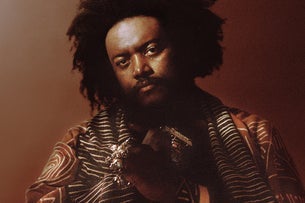Live Review: Kamasi Washington
"There was no telling where it would end, with the band pushing towards breaking point."

Above all - the timbre of his saxophone, his ability to unify an orchestra and bring together a band of longtime friends, the eccentric earthiness of his garb, the frenzy of his face and the fury of his musicianship - Kamasi Washington has a presence. No other venue in Australia could hope to magnify that presence as Sydney's Opera House did. A powerhouse of modern jazz, Washington was incendiary in this sacral space. "My name's Kamasi Washington," he crooned. "We're about to go on a little journey together."
In a flurry of red and indigo, the band kicked into Change Of The Guard with its imposing shifts; a punchy hook into Washington's soft-and-sultry solos and Brandon Coleman's keys to a dystopian diatribe of deliberate brush strokes. The song, an epic in its own right, is an ever-burgeoning explosion of colour and dynamism.
Askim followed, a slower ballad with bossa nova undertones. The lights burned blue as the band were joined by "the man who taught [Washington] all [he] knew', multi-instrumentalist and Washington's father, Rickey Washington. Ryan Porter added his own inflection to the song in a trombone solo that proved elegiac and nostalgic in its tone. Washington Snr then chimed in with his own soprano sax solo that was playful and light, cutting through the intensifying rhythm section.
Patrice Quinn gave a voice to Black Man, a track she co-wrote with Brandon Coleman. In Washington's words, "Patrice has the amazing ability to make a good thing better." The song was a soul-infused, keys-heavy track with a vibe reminiscent of Aquarius/Let The Sunshine In. The opening lyrics say it all: "He speaks, and all else is silence." Backlit, Quinn ascended in golden streaks, her frame frenzied yet graceful; her voice pure and immaculate.
Don't miss a beat with our FREE daily newsletter
Chaos ensued, the ordered chaos of a metropolitan maelstrom. In futurist flurries, Washington abandoned the lyrics and took us through a labyrinth of sinuous sounds. There was no telling where it would end, with the band pushing towards breaking point. Then Quinn returned as saviour figure, finding the words once more and replenishing the simple core of the soulful song.
While he didn't have the verve or fame of Thundercat, the newest member of the band, bassist Joshua Crumbly, held his own in a thick and sloppy bass solo that wouldn't have sounded out of place on a P-Funk record. The solo moved from intricate to simple, minimalist and then profligate in its funky brilliance. That same blended bassline remained throughout as the horn section returned in an exuberant stampede of polychromatic wonder.
Then came the percussive tete a tete from the two drummers. "Don't you know you're supposed to have two drummers?" Washington joked before leaving Robert Miller and Ronald Bruner Jr to their 'conversation'. Truth, from Washington's recently released Harmony Of Difference EP, was truly a masterstroke. The song blended five different melodies as a symbol for diversity, showing there is power in numbers and that, even if we can't all speak the same language, we can embrace our different strokes.








